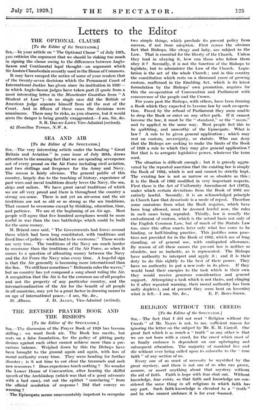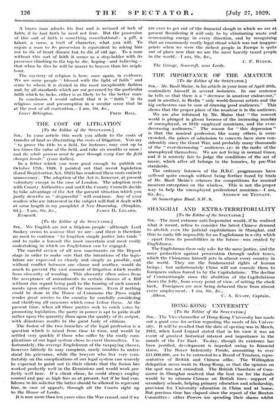RELIGION WITHOUT THE CREEDS
[To the Editor of the SPECTATOR.] SIR,—The fact that I did not read " Religion without the Creeds " of Mr. Noyes is not, to me, sufficient reason for ignoring the letter on the subject by Mr. K. M. Carroll. One great fact which is as much a " truth " as any other is that we are not born with a creed, for the creed which most of us finally embrace is dependent on our upbringing and subsequent education. The majority of mankind live and die without ever being called upon to subscribe to the true faith " of any section of us.
Every one of us must of necessity be mystified by the great mystery, and there is not one of us who can prove, assume, or assert anything about that mystery without the aid of faith. Faith is hope with fear shut out. Without knowledge, fear exists, so that faith and knowledge are con- sidered the same thing in all religions in which faith has any part. Such faith-knowledge is elevated to a " truth" and he who cannot embrace it is for ever (loomed.
'A brave man admits his fear and is accused of lack of faith; if he had faith he need not fear. But the possession of this sort of faith is something constitutional : a gift, a talent, a curse, a trait of character, what you will. To enjoin a man to its possession is equivalent to asking him not to die of heart disease but to die of old age. To a man without this sort of faith it seems as a step-ladder with its possessor climbing to the top to die, hoping—and believing— that when he dies he will be nearer to heaven than his neigh- bour.
The mystery of religion is here, once again, in evidence. We see some people blessed with the light of faith " and some to whom it is denied in the most inexplicable fashion and, by all standards which are not governed by the particular faith which he lacks, either is as likely to be the better man.
In conclusion I would submit that it is faith " in its religious sense and presumption in a secular sense that lie at the root of all contention.—I am, Sir, &c.,



































 Previous page
Previous page